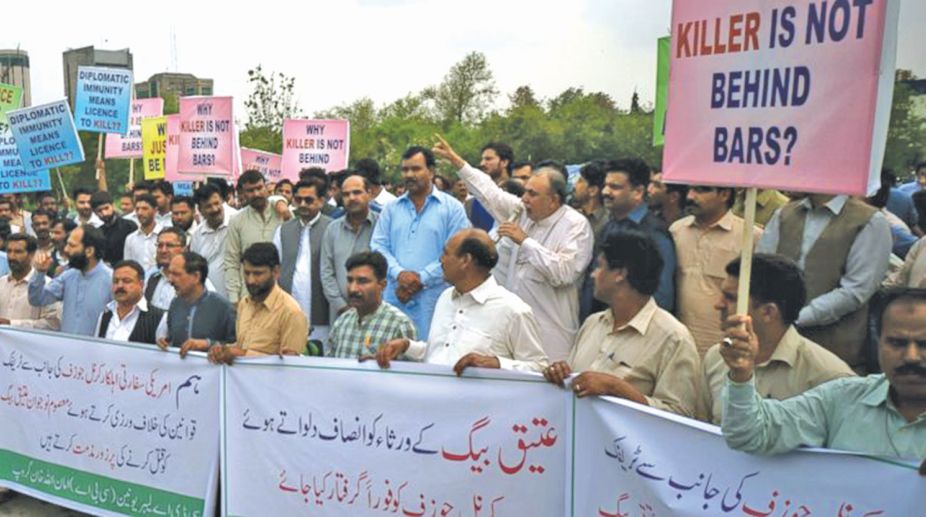The killing of a motorcyclist and injuring of another by the reportedly intoxicated Col Joseph Emmanuel, US military attaché to Pakistan, gave one a sense of déjà-vu.
In 2013, a speeding US embassy vehicle hit two local residents killing one, and in 2011 another US diplomat similarly killed a motorcyclist in a traffic accident.
Advertisement
We also had the highly publicised Raymond Davis episode, in which an embassy vehicle coming to help Davis killed a local man in a hit-and-run while speeding on the wrong side.
There is anger in Pakistan because of the frequency of these killings and public sentiment reflects the view that US officials stationed in Pakistan have little respect for domestic laws or — more alarmingly — the value of human life other than their own.
Under international law, diplomatic agents are entitled to the privileges and immunities associated with their status and are, therefore, exempt from both the civil and criminal jurisdiction of the receiving state.
While there exist a few exceptions relating to private immovable property and certain acts relating to private commercial activity, a diplomatic agent, under Article 31 of the Vienna Convention on Diplomatic Relations of 1961 (VCDR), cannot be prosecuted or punished by a receiving state, nor can orders and regulations of the police be enforced against him.
This, however, does not mean that a diplomatic agent can do as he pleases, because he has a duty to respect the law of the land under Article 41 of the convention as well as a fiduciary duty to represent the sending state in the best light possible.
The preamble of the VCDR states that the purpose for complete immunity for diplomats is “to ensure the efficient performance of diplomatic mission as representing states”.
Unlike diplomatic immunity, consular immunity as defined in the Vienna Convention on Consular Relations of 1963 (VCCR), is not absolute and extends only to acts performed in the exercise of consular function.
Consular staff thus only possesses functional immunity and not the personal immunity enjoyed by diplomatic agents. Pakistan has signed both the VCDR and VCCR and has implemented these laws through the promulgation of the Diplomatic and Consular Privileges Act, 1972.
Because Col Emmanuel is a diplomatic agent the only reactive action Pakistan can take against him is to declare him persona non grata and require him to leave the country.
In lieu thereof, Pakistan also has a few other arguments. For one, it can request the United States to waive the immunity currently enjoyed by Emmanuel, arguing that he has abused his diplomatic privileges, so that it can exercise jurisdiction over him and/or execute a judgement against him.
Sending states — though rarely — do waive diplomatic immunity when sufficient political pressure is exerted by the receiving state or because of reputational loss — or the risk of such loss — in the international community.
In 1997, for instance, Georgia waived immunity for one of its diplomats who killed a teenaged girl in Washington, D.C. in a drunk-driving incident. While not, strictly speaking, a case of waiving diplomatic immunity, the US military, after a series of rapes committed by its servicemen in South Korea, now lets its soldiers stationed there to be tried by South Korean courts.
This is a marked change given that it had previously prevented this by arguing that a status of forces agreement between the two nations only allowed US courts to have jurisdiction over its service members in South Korea.
Alternatively, Pakistan can request the US to try Emmanuel for violations of American law in its domestic courts. Vehicular assaults arising out of traffic infractions and drunk driving are serious crimes in the US and diplomats do not enjoy immunity within their own states.
In 2002 for example, a Russian diplomat was found guilty of involuntary manslaughter in Russia for killing a woman in Canada while driving drunk, and even though in 2006 the US did not waive the immunity of a marine stationed at its embassy in Romania for killing a Romanian musician in a drunk-driving accident, it did court martial him — eventually clearing him of negligent homicide, though finding him guilty of lesser crimes.
The law of diplomatic immunity is contentious because of conflicting concerns. At one extreme, its critics view it as a remnant of archaic laws that is no longer equitable today; indeed, cynics argue that it is less a law stricto senso and more an expression of the messy realpolitik that governs international affairs.
For others, however, the view is that diplomats cannot engage in effective diplomacy without the benefit of such protections. Harassment from a hostile host state towards diplomats of a sending state can often bring diplomacy between the two states to a standstill, as has been witnessed between Pakistan and India.
When it comes to vehicular assaults committed by diplomatic personnel, some countries have also found ways to compensate victims without diluting the diplomatic immunity enjoyed by their representatives.
For instance, both the US and the UK require all diplomatic vehicles to maintain insurance against third-party risks in order to financially compensate victims for loss of property and/or life.
To further minimise such risks, countries can also attempt to regulate or restrict the movement of diplomats or accept diplomatic appointments and credentials only after making careful assessments of the potential threat posed to civilian life and national security in the host country by the official concerned.
Countries might even attempt to enter into a bilateral treaty laying out a framework for reciprocally waiving immunity for diplomatic agents if serious crimes — including vehicular assaults — are involved.
In the present scenario, however, it seems Pakistan will be unlikely to use any of these approaches for holding Emmanuel to account for his criminal recklessness.
Recently, the Trump administration has cut aid and threatened punitive measures against Pakistan over its alleged support for the Afghan Taliban insurgency; it has also succeeded in getting Pakistan placed on a global terror-financing watch list in June. From the muted reaction of the Foreign Office, it seems Pakistan does not want to antagonise the US over the killing of 22-year-old Ateeq Baig.
The writer is former legal adviser to Pakistan’s foreign ministry, and faculty, Lums Law School.
Dawn/ANN.











